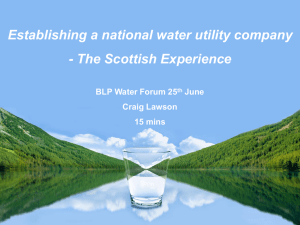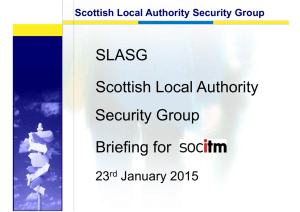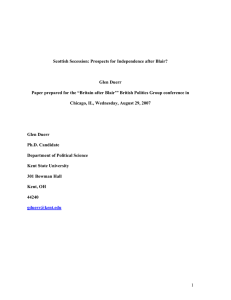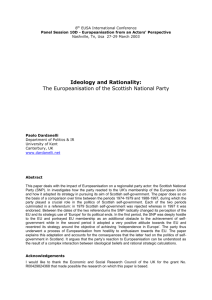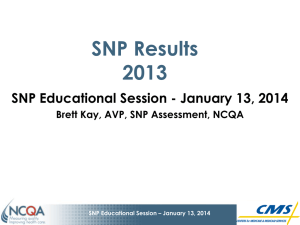Nicola McEwen
advertisement
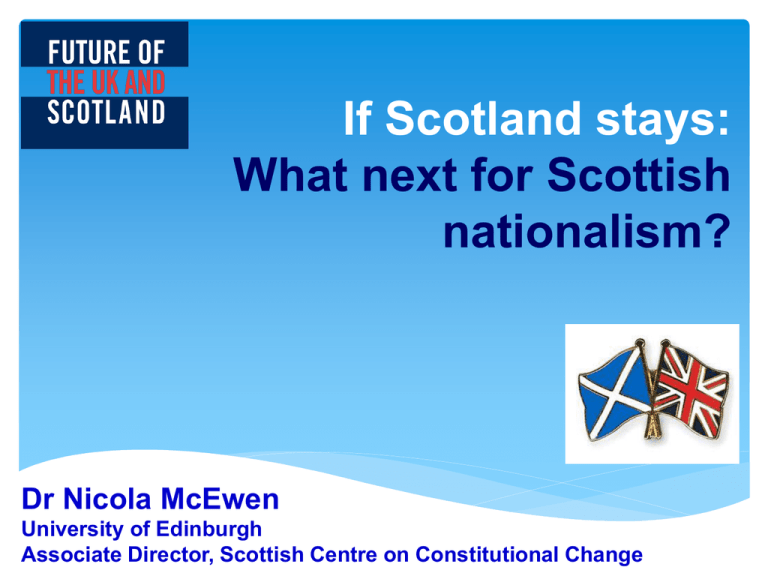
If Scotland stays: What next for Scottish nationalism? Dr Nicola McEwen University of Edinburgh Associate Director, Scottish Centre on Constitutional Change Unpacking the Question What do we nationalism? mean by Scottish What would a NO vote mean for the SNP? What would a NO vote mean for the prospects for independence? From national distinctiveness to nationalist mobilisation Distinctive territorial community/identity mobilised to demand change Political party/strong civil society capable of channelling demands A sense of grievance, or ‘frustration’ with status quo – a catalyst for change “to accept the existence of multiple identities, mutually compatible or not, within a territorial state says nothing about their metamorphosis from social distinctiveness to political expression”. Such a trans-formation requires the “injection of catalysts” Rokkan and Urwin Economy Territory, Identity, 1983 Nationalist Movement 1979 – (pre-)1997 Divergence between Scottish and ‘English’ voting patterns ‘Democratic deficit’ > political grievance. Strengthening of Scottish national identity and weakening of Britishness Broad-based movement united around support for Scottish Parliament Fusion of identity, nationalism and party/ideological politics To be anti-Conservative = pro ‘home rule’ = Scottish identity = pro social democracy Civil Society & the “Claim of Right for Scotland” “We, gathered as the Scottish Constitutional Convention, do hereby acknowledge the sovereign right of the Scottish people to determine the form of Government best suited to their needs” The SNP Government’s Gamble: Absence of Grievance - Presence of Opportunity parliamentary share of seats at 2007 and 2011 Scottish elections SNP Labour Cons Lib Dems Others The only catalyst = SNP electoral success Parliamentary majority = political opportunity Electoral success NOT a result of independence demands Defining Independence Legitimacy of Scotland’s ‘right to decide’ Government-backed blueprint for an independent Scotland ‘Embedded independence’ within EU and British Isles Currency union; energy partnership; common travel area; common research area; ‘National’ lottery; cross-border functional bodies Emphasis on continuities and change “Scotland will continue to have a close and special relationship with the other nations of these isles. This will be a new, updated partnership of equals between the people of Scotland and the rest of the UK” Emergence of the Independence Movement (Source: Bella Caledonia) The Effect of a NO vote on the SNP’s independence goal Continued assertion of Scottish distinctiveness/interests within the Union With more or less leverage, less influence….? Continued commitment to Independence Retention of referendum strategy, but without immediate manifesto commitment Future referendum as response to external catalyst & PQ’s “winning conditions” Continuing the Devolution journey without nationalist cause Reclaiming & redefining ‘Devo Max’ as a nationalist goal Full fiscal autonomy Employment & competition law; regulation of companies Broadcasting, inc new public service broadcasting bodies Social security, with fiscal autonomy – to design new benefit, tax credit & employment support system Equalities legislation Energy policy, marine regulation & Crown Estates Formal participation rights in EU policy-making Further info Dr Nicola McEwen, University of Edinburgh Email: N.McEwen@ed.ac.uk @mcewen_nicola Future of the UK and Scotland Programme website: http://www.futureukandscotland.ac.uk @UKScotland





